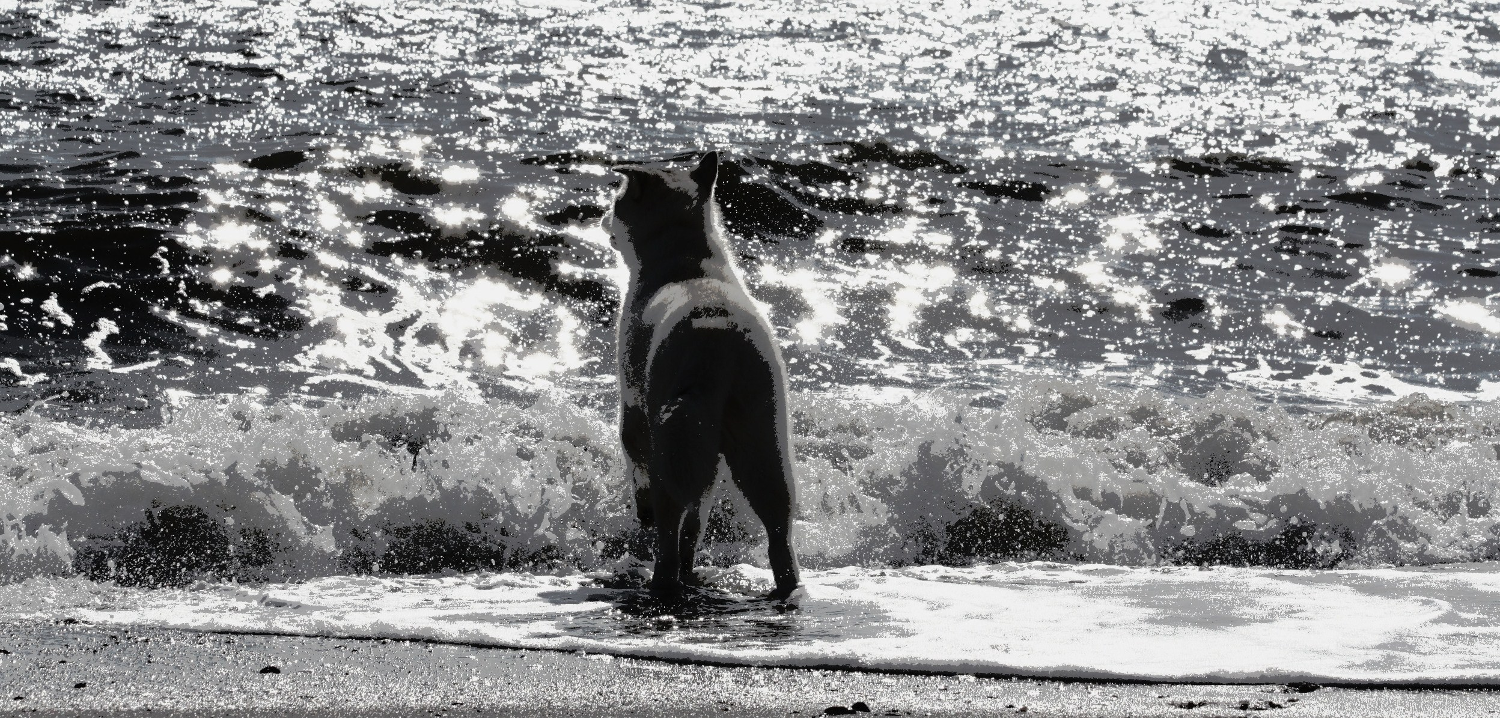Acrimonious Competition for Shared Public Spaces...
... surprised many. Dog guardians and other concerned citizens— both from in-town and across Fairfield county— were startled to learn in 2008 that there was controversy surrounding winter season access for pets at Fairfield beaches. Off-season access had been relied on for so long by dog and horse guardians... it really had been deemed “traditional” years before. Confident of that, many traveled significant distance every week to enjoy Fairfield's most treasured community resource.
Indeed, March 31st, the end of season, was a thing most dreaded: marked as a dark day on many calendars. In an interdependent relationship with their dogs (appearing not so curious: to many whose car seats were draped in old blankets), some seemingly spent the entirety of April through September as though those months represented a self-fashioned prison: impatiently waiting for October's parole, n'er able to find a comparable stand-in for the beach during the intervening warm months. Many described slipping into a near profound depression.
Enduring the summer...
To some in the community-at-large, it might appear odd—no, moreso senseless—how dismissively summer was regarded by certain dog guardians: viewing that what most regard as the best months of the year, as something that was merely to be endured with a consuming glumness.
Indeed, these dog guardians, gripped by a stupefying malaise, plodded through summer with a despairing remorse and regret: evidence of madness, surely?
Those of us so afflicted, however, didn't spend effort in analysis or take concern for need of explanation: if you had a dog in your family, doubtless you could understand! Nowhere could we better come to flourish physically, mentally, or spiritually... to be at peace with this planet... than at the off-leash beach. And that could only be had in winter, which, always seemed to be “very nearly over.”
Sea change...
We just KNEW they'd "ruin it..."
Perhaps, however, the “tradition” had been to our profit unfettered for so long, it had begun to be taken for granted? Many were taken aback that their first awareness of this issue came to light through a newspaper article in the Connecticut Post: “Pet Access Debated For Beach: Fairfield may limit dates, charge owners to bring along horses, dogs,” in February of 2008; very nearly the end of that winter season.
Of course, many were aware that some dog guardians did not clean up after their dogs; and that some seemed casual about maintaining “voice command" of their animals—we knew they’d “ruin it” for the rest of us— but could there be enough of that to warrant what was being suggested?
injurious fees...
Startled dog guardians read that the Parks & Recreation Commission (specifically, the Rules Subcommittee) was considering the imposition of an extraordinary and punishing $400 or $800 permit fee to bring a “pet” (horse or dog) to the beach: the high figure, assigned to discipline—or discourage—
non-Fairfield residents.
That alone, would surely spell the end of winter-season beach access for families with dogs: when interviewed, a local expert observed that the “enormously high” figure would “wipe out most of the people who go down there.” Even of those with financial means, it was doubtful that on basis of principle, that they would be willing to be held hostage to such fees. At the beach itself, astonished dog guardians questioned: Who would be left? What dogs would be here for mine to play with? And for those with more than one animal: were the fees per dog or horse? Gallingly, no answers were forthcoming...
shortened season...
Further, the Rules Subcommittee was considering abridging the season by a month at both ends: from the then-current October 1st - April 1st; to the shorter November 1st - February 28th. All the better to separate the dog-haves and the dog-have-nots: even though often, intrepid dogs and their sturdy guardians are the only ones venturing to deserted Fairfield beaches in harsh weather.
From six months to four months. At $100 a month ($200 if you were not a Fairfield resident), some began to mash the math: most being weekend-only beach-goers, that worked out to as much as $25 a visit… to walk a dog on a cold, deserted beach? It seemed bizarre, unimaginable… unconscionable… that anyone could contemplate fees of that level, and proffer it with seriousness as reasonable public policy.
Bound by those metrics, it appeared to be already over: weeks later into the discussion, it didn’t seem that anyone knew anyone who would be capable of visiting the beach with their dog… or, just as importantly, would willingly yield to that regarded as “town-sanctioned ransom.” But then, some theorized, perhaps that result was the idea:
no dogs at the beach.
Why not Mutual Respect
for Diverse POVs... ?
Certainly, it was obvious, that there would always be people who disliked dogs at the beach (indeed, for some: any public open space). For example, certain abutting homeowners owners were weary that dogs repeatedly contravened their property lines; others were irritated because of “the mess”; or because, as the First Selectman wrote us: “...we've received some furious letters from people who have been jumped on by dogs.”
Reasonable dog guardians respect that private property borders are contiguous to Fairfield's public beaches in many places; and, attending fences are erected for privacy. Common sense dictates that pursuing a “border war” sabotages potential to build communication channels between the stakeholders.
Undeniably, “the mess” can be appalling; and conscientious dog guardians are disappointed and embarrassed that some don't—or worse: even refuse—to clean up after their animals.
Dog guardians must also acknowledge that not everyone shares their love of canines; and further need to accept that some people are afraid of dogs—perhaps paralyzingly so—for a myriad of reasons. Some, just don't wish to be around them. There are many reasons a person might find dogs objectionable—that is for an individual to choose for him or herself, without regard to the opinions of others—and those with dogs in their families should hold no privilege to criticize that decision-making.
Unwelcome “analysis”
Regardless of the insistence of some dog guardians on the issue: the beach is not the place to play at amateur psychiatry; nor to oblige change on another person's choices or fears.
It is, after all, a public place, where, within reason, one should be comfortable... even if that means intentionally not interacting with others.
And it had always been true that, most would uneasily acknowledge the occasional jogger, beleaguered through no fault of his own, unintentionally initiating a misdirected “chase instinct” in an over-stimulated dog. Empathy (sympathy?) in those instances was appropriate: it couldn't be a pleasant thing for that person to have a dog “lunge” at him as he sprinted by, during what could have been a quiet (or at least uninterrupted) morning constitutional. A walker or runner shouldn't be expected to discard his affection for the environment of the beach to enjoy or train on, nor to acquiesce his freedom to those ego-centrics neglecting to control their dogs.
But many also questioned
whether a sense of proportion
was being intentionally discarded:
... and questioned how it was possible, so unknowingly, that the situation had come to such an abrupt impasse. Were dogs intentionally wandering into contiguous yards? How serious was the problem of dog waste? How many other types of complaints had been made, and were there any injuries? What were the statistics, of winter-season beach use: evaluating numbers of dog guardians to non-dog guardians? Couldn’t a balanced approach respectfully incorporate the interests of all?
Seeking a more reasoned
(and reasonable)
scrutiny...
In the end, even our First Selectman (2009), in a letter to us, acknowledged that those that failed to clean up after their dogs comprised: “admittedly, a small minority.” Obviously, caricaturing dog guardians as casual about the environment has been mis-focused and overbroad for some time.
Further, was it not also reasonable to suggest more aggressively questioning complaints about "unruly dogs," by considering that often, is it really jumping on or “lunging” at a person;... or, at least some of those times, just a careless and over-exuberant attempt at a greeting: from a dog gone just a bit overboard... in a keyed-up state... owing to the excitement of play?
Given the understanding that across most breeds, a dog's cognitive abilities are comparable to those of a 3-year old child: what would a truly rational expectation for their behavior be, overall, and what limits should be realistically set? Do we become angry at a child who absentmindedly bumps into us at the playground?
Over time, more than a few questioned the reasonableness of complaints, but beyond that, if some weren't misrepresented or even entirely fictional: authored to serve a purpose. In parallel, a number of dog guardians had been frustrated observing those few “hardened” joggers who seemed to stomp straight through groups of dogs, angrily scattering them in every direction... surely creating a combative platform for debate.
Was it perverse that the dog guardian should likewise covet the expectation that he could enjoy the beach untrammeled, with his entire family... when that included his dog? Shouldn't town government recognize that prohibiting dogs means prohibiting families? ... that for many, focused on their definition of family: that such a policy can singularly annihilate the town's reputation? Why was there such acrimonious competition for use of a public beach?
A minority of miscreants are often used to characterize the rest...
This is a tendency which we caution all in this conversation must resist: since it is fair to say that there would be many competing stories to tell.
There will always be competition within shared public spaces in Fairfield. Discussion must depart from that platform. The key is managing those dynamics to accommodate the varying interests and expectations of the thousands who visit the beaches throughout the year, and in resisting the tendency to incorporate intolerance as the over-arching theme that frames the examination of beach access.
It's now ten years on: in 2018, dog guardians look back and many are satisfied at the compromise reached with the town in 2008. Not all agree. And, for example, some are rightly critical of the (2008; and still standing) Town signage that simply presumed dog guardians to be discourteous.
Lacking an essential fairness of representation?
Unlike other forms of passive or active recreation which consume heavy Town funding: allowing dog guardians to bring their entire families (their dogs) to the beach during the winter months (when those areas are often deserted) costs nothing.
Many others are Fairfield residents, who resist complaining that more than half of the Town budget is turned to the public schools in which they don’t or have never had children attending. Targeting the Town’s top-tier schools, however, is mis-focused frustration.
More accurately, many note that merely within the scope of Parks & Recreation Commission authority, Fairfield funds a myriad of “passive” and “active” recreation activities across the entire town—some on extraordinarily costly properties—and maintains a broad and impressive range of grounds, fields, structures and buildings, and extended services for these purposes. These people contribute to those as well, yet may often never use them. And they would be swiftly rejected as “trespassers” at any of those facilities or fields if accompanied by their dogs.
In contrast, allowing dog guardians to bring their entire families (their dogs) to the beach during the winter months—when those areas are commonly deserted—costs the Town nothing.
The “dirty” winter beach thrust upon us by a selfish minority remains a problem. Self policing may not be the ideal, but it is important to note that in our ongoing efforts, without funding, Fairfield Beach Access members clean the beaches regularly and regardless of weather or snow cover. In this, we remove other trash, and in spring 2013, more than 70 pounds of broken glass hand-picked from Jennings and Penfield beaches. We also maintain a trash receptacle at Jennings beach, which is utilized by many more than those with dogs.
Nevertheless, in 2016 debate within the Commission again turned to discussion of revoking beach access: referencing it as a concept of “privilege.”
The suggestion to establish a Town “dog park” had been advocated in the past. Seasoned dog guardians have rejected that idea as discriminatory and intended to segregate. Cited were many examples of futilely unsuccessful dog parks that, despite efforts, degrade into “outlaw” playgrounds that conscientious dog walkers avoid: “... populated by people who are obsessed with their smart-fones and gulp their Starbucks while their dogs run amok.” Such contained spaces also present unavoidable issues for transmission of bacteria and disease.
Privilige:
a wrong word
There is a disproportionate expectation:
that in a diverse community, opponents can simply stamp out
that which they do not participate in.
Other suggestions included (again) a fee-based winter season dog walking pass: for Fairfield residents. This proposal pursues the shamefully unwarranted—and objectionable—view of assigning blame to a specific group; and that Fairfield’s public resources should not be shared outside of the local community. Weary of defending themselves in the face of this unreasonable situation, a growing number of dog guardians have begun to announce—with a stinging bitterness—that “enough... is enough.”
We must confront the societal phenomena of refusing to apply standards in a rational and even-handedly way. This may be a failure of government: when it entertains or endorses combative dialog. More importantly, however, we must challenge certain opposition to dog guardians that is unreasonable and subordinates other social and practical concerns to a one-dimensional goal. There is a disproportionate expectation that in a diverse community, opponents can simply stamp out that which they do not participate in.
Winter season beach access should not be dismissively regarded as a “privilege.” It is something that taxpayers with dogs have earned, and some even bought houses in Fairfield on that expectation.
Winter season beach access should not be dismissively regarded as a “privilege.” It is something that taxpayers with dogs have earned, and some even bought houses in Fairfield on that expectation.
In the 2016 debate, the Commission seemingly held a fundamental misunderstanding that off-season “beach access” held no intrinsic value to the Town, and that only tangible recreational venues contributed to the image of Fairfield as a place to visit or invest in as a place to live and buy property. This is a stunning miscalculation.
As frustration escalates, dog guardians must continue to advocate for themselves, to secure participation in a respectful exchange of ideas between the various stakeholders. As part of that process, valuing an essential fairness of representation is important: ensuring for recognition that beach access is a fundamental asset to the Town, and should be regarded with a measure of favor similar to other recreational assets that the Town endorses and pursues.
The entire paradigm of how beach access is regarded in Fairfield needs to dramatically improve. This will necessitate a collaborative effort among competing groups. That goal, however, should be easily achievable with reasoned energy that disallows incorporating intolerance as its over-arching framework.
“W.H. Auden once remarked that there was only one thing that all poetry had to do: “it must praise all it can for being and for happening.” One of the great and never-ending blessings of dogs is that they never tire of demonstrating that by example. And one of the great consolations of our relationships with dogs is that we’re given the chance, over and over again, to learn that lesson and to behave as though we have, no matter how persistently we seem to refuse to do so.”














